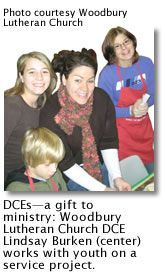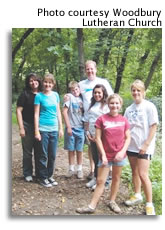by Dean Nadasdy
I write this to raise a Te Deum for the ministry of directors of Christian education. God’s grace in their ministry has blessed our Synod for 50 years.
|
||||
Through four decades I’ve had a director of Christian education—a “DCE”—by my side in ministry.
Without exception, each has brought his or her own set of blessings to the congregations I have served as pastor. Though mine is only one pastor’s story of life with a DCE, it has been repeated with variations many times over the past half century. Back in the 1970s (and earlier) some teachers functioned in the role of DCE. Eventually, many found their way into DCE certification.
By my side at Grace Church in Eugene, Ore., were two such teachers: Bob Fossum and Dan Raguse. They brought music to our ministry with the obligatory guitars. (DCEs seem to come with guitars.) Bob and Dan even formed a countrywestern group, the Chitlins, that entertained and witnessed throughout the Northwest.
I recall school chapels filled with laughter as we improvised dramas on Bible stories, knowing where we were to end up but never sure how we’d get there. They were two of the most creative Christian servants I’ve ever known. Over the years, both contributed to national youth gatherings. Bob still serves as a DCE in Aloha, Ore. Dan, also still in Oregon, produces educational media. In the 1980s and ’90s, I was blessed to have three DCEs by my side at Cross View Lutheran Church in Edina, Minn. Paul Krentz and I worked together for 10 years there. Paul was our first staff addition.
I’ve never seen a church leader work harder. Paul’s love for people and his deep, personal faith made him a strong servant leader. He put a wide array of educational programs into place. And, yes, he had a guitar and a voice that enriched our worship services. Paul moved on to become a ministry specialist in the LCMS Texas District. DCE Lisa Keyne led Cross View Lutheran in its outreach and adulteducation ministries while I was there. She brought contagious enthusiasm and excellence to her work. With us for only a short time, she was as productive as any DCE I’ve seen.
She went on to direct the DCE program at Concordia University Nebraska and then to serve in administrative posts in higher education. DCE Lyle Heggemeier was at my side in Edina also. In our time together, he had a great heart for outreach and formidable skills in administration that compensated for my lack of the same. He stayed on in the pastoral vacancy when I left to teach at Concordia Seminary, St. Louis, providing continuity in the transition. He’s done that three or four times in his ministry. Lyle still serves as a DCE in Rochester, N.Y. Still another DCE by my side at Cross View was Audrey Duensing- Werner. Once again, a creative spirit and boundless energy brought freshness to children’s ministries and to our life together as a church. And her voice! When she sang in worship, we were transfixed. Audrey still serves as a DCE in Topeka, Kan. 
Then since 2000 four DCEs have served by my side here at Woodbury Lutheran Church in Woodbury, Minn. Actually, at this time all four are serving together. Derek Broten, Joel Symmank, Lindsey Burken, and Stacy Winter differ from each other in many ways. Their gifts extend across our congregation’s varied youth ministries and continue to expand and diversify. Derek focuses on youth community outreach and is now enrolled in the Specific Ministry Pastor program at Concordia Seminary, St. Louis.
He will coordinate our Saturday worship community. Joel works with senior high youth and has expanded his responsibilities to include coordinating worship and music in one of our worship venues. Lindsey works with junior high youth and has a great heart for ministry with teenage girls. She spends her spare time pursuing graduate work in adolescent studies at the University of Minnesota. Stacy brings amazing administrative and communication gifts to our youth ministry.
These four are part of a church staff that includes pastors, a vicar, teachers, and lay workers—a team committed to sharing the love and Good News of Jesus Christ in our homes, church, community, and world.
A Little History
DCE ministry in The Lutheran Church—Missouri Synod began when the Synod’s 1959 convention encouraged congregations “to establish the office of ‘director of Christian education’ in order to provide additional leadership for the education program of the congregation.” In a second resolution, the convention granted eligible DCEs “all the rights and privileges” pertaining to teachers, stating that they should be considered as such. Directors of religious education had appeared in large urban churches of other denominations as early as a century ago.
One program that revealed the value of trained youth ministry leaders was a joint effort of Valparaiso University, the Synod’s Board for Young People’s Work, and the Lutheran Laymen’s League. They established the Youth Leadership Training Program at Valparaiso. Graduates of the program began working in LCMS congregations, highlighting the value of specialists in youth ministry.
Among them was Rich Bimler, who would later serve as executive director of Synod’s Board for Youth Ministry. Synod’s first DCEs often worked with pastors in churches that did not have day schools but needed leadership in Sunday School, youth, or music ministries. Churches with day schools often continued to use teachers to assist with other education and youth ministries.
In 1962, the Synod in convention authorized two of its colleges (Concordia, River Forest, Ill., and Concordia, Seward, Neb.) to begin specific training programs for DCEs leading to dual certification as both teachers and DCEs. That dual certification is still offered as an option at some of our Synod’s universities today. In 1969, the Synod’s Board for Higher Education commissioned Concordia College, St. Paul, Minn., to begin a training program for DCEs that did not require teacher certification. Concordia College, Portland, Ore., and Concordia College, Irvine, Calif., began programs in 1977, with Concordia, Austin, Texas, adding its DCE program in 1999. These six universities still train Synod’s DCEs today. In 1999, an important definition of DCE ministry was offered at an annual DCE summit: “A director of Christian education is a synodically certified, called, and commissioned lifespan educational leader prepared for team ministry in a congregational setting.”
DCE Ministry Today
Defining a DCE as “a lifespan educational leader” captures well DCE ministry today. While many are generalists who work with children, youth, and adults, an increasing number of DCEs specialize in ministries focused on youth, small groups, or adult education. The number of directors of Christian education certified in the LCMS is approaching 1,800.
Almost 700 of those are serving in congregational settings today. DCEs connect with one another via a national organization, a national DCE conference every three years, and, in many LCMS districts, via regular professional conferences. Actually, a continuous line of resources and communication has been provided over the years.
Founded in 1999, KINDLE (the Karpenko Institute for Nurturing and Developing Leadership Excellence) provides a year-long process designed to enhance the servant leadership of DCEs at several levels of experience. Dr. Bill Karpenko, for whom KINDLE is named, directed the DCE program at Concordia University Nebraska.
In retirement, Karpenko continues to influence DCE ministry. With a team of veteran DCEs, he’s looking at the career paths open to DCEs in the future. “Karp” sees a brightening future for directors of education. “Relationships with their senior pastor and with other staff are still the most significant factors impacting a DCE today,” he says. He sees those relationships as increasingly healthy.
He also sees more women entering DCE ministry and staying on even through their child-rearing years. “Gratefully, we now see DCEs serving into their 30th and 40th years,” Karpenko adds. Dr. LeRoy Wilke, a former congregational DCE, directed the DCE program at Concordia University, St. Paul, and went on to serve as executive director of Synod’s Board for District and Congregational Services.
Wilke notes the diversity of hats DCEs wear from setting to setting. He appreciates how the ministry of the DCE has broadened beyond its initial focus on youth. “As the LCMS and its DCEs get older, we will see a greater focus on adult education and ministry with seniors,” Wilke says. With enrollment in the church worker programs at our universities decreasing, Wilke joins others in considering our seminaries as future training centers for specialized ministries that complement the pastoral office. Dr. Steve Arnold, another former congregational DCE and director of the DCE program at Concordia, St. Paul, likes where DCE ministry is heading.
“We have an opportunity today to do some reframing of the ministry toward greater lifespan education,” he explains. “We can help each person live out their calling at every step, right up to the end-of-life planning.” He suggests that the DCE ministry of Word and service may mark it more as the work of a deacon, not unlike the first deacons of the early church. In talking to the veterans, one sense a deep love for DCE ministry and a desire to conserve and improve the profession for the future. Reminiscent of the apostle Paul and his missional traveling companions, and of Luther and his colleague, Philipp Melanchthon, the pastor/DCE relationship is a treasure in our church. DCE ministry reminds us pastors that we were never meant to be Lone Rangers.
The work of servant leadership has always been a team effort, multiplying the number of God’s people invited, trained, and affirmed in ministry. For me, my life and ministry have been enriched by the DCEs at my side. The parade of guitar-playing, marker-wielding, messy-officed, Frisbee-tossing, texting, and tweeting servant leaders has reinvigorated my heart for ministry again and again. I know those descriptions perpetuate DCE stereotypes, but to some extent they explain why DCEs have so captured the hearts of our churches. As they celebrate 50 years of service in the LCMS, may our directors of Christian education continue to know our encouragement, gratitude, and respect.
For another perspective on DCE ministry, see the Reporter commentary by Dr. Bill Karpenko at lcms.org/reporter. Karpenko served in DCE-type positions in the 1960s and spent more than three decades in Lutheran higher education—as a DCE program director for 21 of those years. —Ed.





